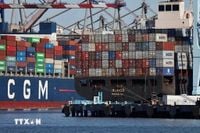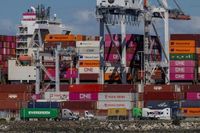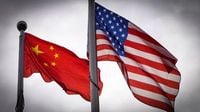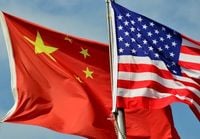On March 25, 2025, the U.S. government announced the addition of six subsidiaries of Inspur Group, a leading Chinese technology corporation, to its export control list, citing national security and foreign policy reasons. This move is part of an ongoing effort to tighten trade restrictions between the U.S. and China amid escalating technological competition.
According to the U.S. Department of Commerce, the subsidiaries of Inspur were listed due to their involvement in developing supercomputers for the Chinese military. Among those added, five companies are based in mainland China, while one is located in Taiwan. Notably, Inspur Group was previously added to the list in 2023.
The latest update has seen approximately 80 entities added to the U.S. Department of Commerce's entity list, with over 50 of those from China. Entities from Taiwan, Iran, Pakistan, South Africa, and the United Arab Emirates were also included. A representative from the Department of Commerce stated, "We will not allow adversaries to exploit U.S. technology to bolster their military and threaten national security." The measures specifically target strategic technologies such as high-performance computing, quantum technology, advanced artificial intelligence, and China's hypersonic weapons programs.
The Chinese Embassy in Washington reacted strongly, declaring its firm opposition to the U.S. actions. They demanded that the U.S. stop politicizing trade and technology issues, accusing Washington of using military-related justifications to impose these controls.
In addition to targeting China, the Biden administration is also expanding oversight of activities related to Iran. The administration aims to disrupt supply chains linked to unmanned aerial vehicles, defense equipment, and ballistic missile development programs in the Middle Eastern nation.
Entities placed on the Entity List face strict barriers in transactions with U.S. businesses. Any export, transfer of goods, or technology from the U.S. to the listed entities requires a license, which is often denied. Jeffrey Kessler, a Commerce Department official, emphasized that these measures aim to prevent U.S. technology and products from being used for military purposes, such as high-performance computing, hypersonic missile development, military aircraft training, and unmanned aerial vehicle (UAV) production.
Inspur Group has yet to comment officially on the U.S. decision. Following the previous listing of Inspur Group last year, executives from AMD and Nvidia were questioned about their business relationships with the company. At that time, U.S. tech firms were assessing whether to halt the provision of products and services to Inspur's subsidiaries. Currently, Nvidia has declined to comment, and AMD has not responded to media inquiries.
Moreover, the U.S. Department of Commerce has added approximately 80 organizations to its entity list, including over 50 entities based in China. This list also includes companies from Taiwan, Iran, Pakistan, South Africa, and the UAE. The U.S. aims to curb China's development in critical technology areas such as high-performance computing, quantum technology, advanced AI, and hypersonic weapons programs.
Secretary of Commerce Howard Lutnick stated, "We will not allow adversaries to exploit U.S. technology to strengthen their military and threaten American lives." This assertion reflects a broader strategy to restrict the technological advancements of China, particularly in military applications.
In addition to Inspur, other Chinese companies like Nettrix Information Industry Co, Suma Technology Co, and Suma-USI Electronics were also added to the list for their roles in supporting the development of China's exascale supercomputers. These supercomputers are capable of processing vast amounts of data at incredibly high speeds, enabling large-scale military simulations.
These companies have allegedly provided manufacturing capabilities for Sugon (Dawning Information Industry Co), a server manufacturer already on the list since 2019 for constructing supercomputers for the Chinese military. The new punitive measures also target Iran's procurement of UAVs and related defense items.
This is not the first time major Chinese tech firms have been added to the trade blacklist. In 2023, when Inspur Group was placed on the list, executives from AMD and Nvidia were scrutinized regarding their business ties to the company. Kessler summarized the administration's goal as preventing U.S. technology from being misused for high-performance computing, hypersonic missiles, military aircraft training, and drones that threaten national security.
Furthermore, the U.S. has added the Test Flight Academy of South Africa (TFASA) to the trade blacklist to prevent the use of U.S. items in training Chinese military forces. The expanded list also aims to disrupt Iran's procurement of UAVs and related defense items and to undermine the development of unsafeguarded nuclear activities and ballistic missile programs.
Kessler remarked that the Entity List is "one of many powerful tools we have to identify and prevent foreign adversaries from seeking to exploit U.S. technology for nefarious purposes." This ongoing tension in U.S.-China relations highlights the complexities of global trade and security in an increasingly competitive technological landscape.







